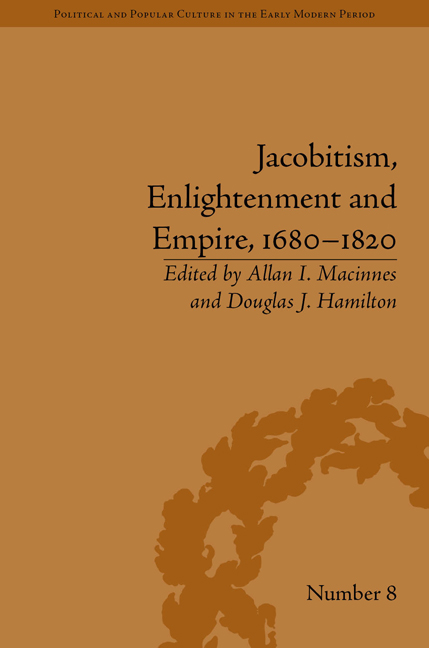Book contents
- Frontmatter
- CONTENTS
- List of Contributors
- List of Tables
- Introduction: Identity, Mobility and Competing Patriotisms
- 1 Jamie the Soldier and the Jacobite Military Threat, 1706–27
- 2 Simply a Jacobite Heroine? The Life Experience of Margaret, Lady Nairne (1673–1747)
- 3 Missionaries or Soldiers for the Jacobite Cause? The Conflict of Loyalties for Scottish Catholic Clergy
- 4 English Liturgy and Scottish Identity: The Case of James Greenshields
- 5 ‘Let Him be an Englishman’: Irish and Scottish Clergy in the Caribbean Church of England, 1610–1720
- 6 Scotland, the Dutch Republic and the Union: Commerce and Cosmopolitanism
- 7 Clearing the Smokescreen of Early Scottish Mercantile Identity: From Leeward Sugar Plantations to Scottish Country Estates c. 1680–1730
- 8 Union, Empire and Global Adventuring with a Jacobite Twist
- 9 John Drummond of Quarrel: East India Patronage and Jacobite Assimilation, 1720–80
- 10 William Playfair (1759–1823), Scottish Enlightenment from Below?
- 11 The Visionary Voyages of Robert Burns
- 12 ‘Defending the Colonies against Malicious Attacks of Philanthropy’: Scottish Campaigns against the Abolitions of the Slave Trade and Slavery
- Abbreviations
- Notes
- Index
2 - Simply a Jacobite Heroine? The Life Experience of Margaret, Lady Nairne (1673–1747)
- Frontmatter
- CONTENTS
- List of Contributors
- List of Tables
- Introduction: Identity, Mobility and Competing Patriotisms
- 1 Jamie the Soldier and the Jacobite Military Threat, 1706–27
- 2 Simply a Jacobite Heroine? The Life Experience of Margaret, Lady Nairne (1673–1747)
- 3 Missionaries or Soldiers for the Jacobite Cause? The Conflict of Loyalties for Scottish Catholic Clergy
- 4 English Liturgy and Scottish Identity: The Case of James Greenshields
- 5 ‘Let Him be an Englishman’: Irish and Scottish Clergy in the Caribbean Church of England, 1610–1720
- 6 Scotland, the Dutch Republic and the Union: Commerce and Cosmopolitanism
- 7 Clearing the Smokescreen of Early Scottish Mercantile Identity: From Leeward Sugar Plantations to Scottish Country Estates c. 1680–1730
- 8 Union, Empire and Global Adventuring with a Jacobite Twist
- 9 John Drummond of Quarrel: East India Patronage and Jacobite Assimilation, 1720–80
- 10 William Playfair (1759–1823), Scottish Enlightenment from Below?
- 11 The Visionary Voyages of Robert Burns
- 12 ‘Defending the Colonies against Malicious Attacks of Philanthropy’: Scottish Campaigns against the Abolitions of the Slave Trade and Slavery
- Abbreviations
- Notes
- Index
Summary
Described in 1906 as ‘bright among the honoured names of those women who thus took part in the troubles of their country’, Margaret, Lady Nairne (1673–1747) has featured regularly, albeit briefly, in Jacobite historiography. Referred to as someone who was ‘born of heroic blood’ and who handed her ‘traditions of loyalty and chivalry to the Stuart cause’ to successive generations, Lady Nairne appears to have exerted a considerable influence on those around her. As well as instilling her own offspring with firm Jacobite beliefs, Lord John Murray, Earl of Tullibardine and later first Duke of Atholl who was also her brother-in-law, denounced her for ruining three of his sons by persuading them to join the rising of 1715. She has been noted for entertaining Charles Edward Stuart prior to the rising in 1745, and of commanding men and arms from her bed on this occasion, only two years before her death at the age of seventy-five. Women involved in the Jacobite movement have been recognized for notable or heroic acts but generally their actions have been romanticized. The most famous of Jacobite heroines has occasioned the comment that the ‘history of the eighteenth-century highlands has been written as though no other woman, other than Flora Macdonald, ever lived there’. There is no intention here to denigrate women's heroic deeds, or to challenge their commitment to Jacobitism, but seeing these women in an artificial, romantic light diminishes their accomplishments and consigns them to the periphery of the Jacobite movement.
- Type
- Chapter
- Information
- Jacobitism, Enlightenment and Empire, 1680–1820 , pp. 29 - 42Publisher: Pickering & ChattoFirst published in: 2014

